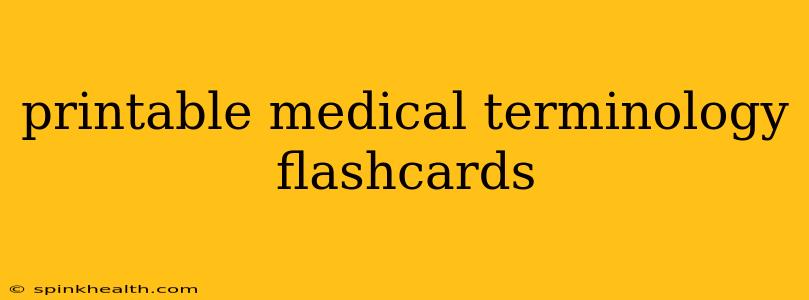Navigating the world of healthcare can feel like deciphering a secret code, especially when faced with complex medical terminology. But what if I told you that understanding this "code" could empower you, whether you're a medical student, a healthcare professional brushing up on your knowledge, or simply someone curious about the human body? This is where printable medical terminology flashcards come in – your personal, pocket-sized key to unlocking the language of medicine.
Imagine this: You're at the doctor's office, and the physician uses a term you don't understand. Instead of feeling confused and hesitant to ask, you can discreetly glance at your flashcards and instantly grasp the meaning. This simple act can empower you to participate more actively in your healthcare journey. Let's explore why these flashcards are invaluable and how to make the most of them.
Why Use Printable Medical Terminology Flashcards?
Flashcards offer a powerful learning method, turning the often-daunting task of memorizing medical terms into an engaging, manageable process. They allow for focused study, perfect for short bursts of learning throughout your day. Their portability means you can study anywhere – during your commute, while waiting in line, or even during your lunch break. Furthermore, the act of physically writing the terms and definitions helps solidify the information in your memory. It’s a hands-on approach that boosts retention far beyond passively reading.
What Information Should My Flashcards Include?
Creating effective flashcards requires a strategic approach. Here’s a breakdown of what to include:
- Term: On one side of the card, write the medical term clearly and concisely. Use a bold font for better visibility.
- Definition: On the other side, provide a concise and accurate definition. Avoid jargon; aim for clarity. Consider adding a simple example to enhance understanding.
- Pronunciation: Include phonetic spellings (using IPA or a simplified system) to aid pronunciation. This is particularly helpful for complex terms.
- Mnemonic Devices: If applicable, create a memorable mnemonic device to assist recall. A silly sentence or visual image can significantly improve memory retention.
- Image/Diagram (Optional): For visual learners, including a small image or diagram can significantly improve understanding and recall.
How to Create Your Own Medical Terminology Flashcards
Creating your own flashcards allows for customization to your specific needs and learning style. Here's a simple process:
- Choose Your Terms: Select terms relevant to your field of study or interest. Start with a manageable number and gradually increase as you progress.
- Gather Resources: Utilize medical dictionaries, textbooks, and online resources to obtain accurate definitions and pronunciations.
- Prepare Your Materials: You’ll need index cards (physical or digital), pens, and possibly a printer for images.
- Design Your Cards: Follow the guidelines above, keeping your cards concise and visually appealing.
- Review Regularly: Consistent review is key. Space out your reviews using techniques like the Leitner system to optimize retention.
What are Some Common Medical Terminology Categories to Include on Flashcards?
This will depend greatly on your specific needs, but here are a few popular categories:
- Body Systems: Cardiovascular, Respiratory, Nervous, etc.
- Diagnostic Procedures: X-rays, MRI, CT scans, etc.
- Surgical Procedures: Appendectomy, Hysterectomy, etc.
- Medical Suffixes and Prefixes: Understanding common prefixes and suffixes will unlock the meaning of many words.
What are some tips for memorizing medical terminology effectively using flashcards?
Effective memorization requires a strategic approach beyond simply flipping through the cards. Try these techniques:
- Spaced Repetition: Review cards at increasing intervals to combat the forgetting curve.
- Active Recall: Test yourself without looking at the answers.
- Use Multiple Senses: Say the terms aloud, write them down, and visualize their meanings.
- Teach Someone Else: Explaining concepts to another person solidifies your understanding.
Are there any free printable medical terminology flashcards available online?
While I cannot directly link to specific websites due to my limitations, a quick search on Google or other search engines for "free printable medical terminology flashcards" will yield many results. Remember to critically evaluate the source's reliability before using any flashcards you find online.
Creating and using printable medical terminology flashcards is a powerful and effective learning technique. By following these tips, you can transform the often-daunting task of learning medical terms into a rewarding and achievable goal. Remember, consistent effort and smart study techniques are the keys to mastering this essential vocabulary. Now, go forth and conquer the language of medicine!

